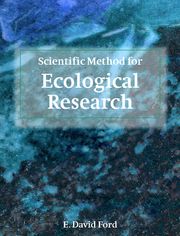Book contents
- Frontmatter
- Contents
- Preface
- Acknowledgements
- 1 Component processes of ecological research
- Introduction to Section I: Developing an analytical framework
- 2 Five processes of research planning
- 3 Conceptual and propositional analysis for defining research problems
- 4 Development of a research plan
- 5 How theories develop and how to use them
- 6 The art of measurement and experiment
- 7 Methods of reasoning in research
- 8 Assessment of postulates
- 9 Individual philosophies and their methods
- Introduction to Section II: Making a synthesis for scientific inference
- Introduction to Section III: Working in the research community
- Introduction to Section IV: Defining a methodology for ecological research
- Appendix: Suggestions for instructors
- References
- Glossary
- Author index
- Subject index
3 - Conceptual and propositional analysis for defining research problems
Published online by Cambridge University Press: 08 January 2010
- Frontmatter
- Contents
- Preface
- Acknowledgements
- 1 Component processes of ecological research
- Introduction to Section I: Developing an analytical framework
- 2 Five processes of research planning
- 3 Conceptual and propositional analysis for defining research problems
- 4 Development of a research plan
- 5 How theories develop and how to use them
- 6 The art of measurement and experiment
- 7 Methods of reasoning in research
- 8 Assessment of postulates
- 9 Individual philosophies and their methods
- Introduction to Section II: Making a synthesis for scientific inference
- Introduction to Section III: Working in the research community
- Introduction to Section IV: Defining a methodology for ecological research
- Appendix: Suggestions for instructors
- References
- Glossary
- Author index
- Subject index
Summary
Summary
Scientific research requires that we place the subjective process of developing new ideas into a logical framework of challenge and questioning through debate and the collection of new data. This is a continuous process (Fig. 3.1), and the iteration between axioms and data is driven forward by four processes – imagination, investigation, comparison, and deduction. These develop knowledge through three states: (1) axioms that already have been researched and refined, (2) postulates that you wish to research, and (3) data statements that describe how data will be collected and used to assess a postulate.
To begin in research you must make a conceptual and propositional analysis. Axioms and postulates must be defined and a description given of the data statements required to examine the postulates. The key to these definitions is a critical analysis of the concepts they use. The component concepts provide a network of connections among axioms and between axioms and postulates. Concepts can be classified according to their status in the function of research, i.e., whether they are well researched, are recently constructed from imagination, or are measurements. Classifying concepts allows you to define and describe your knowledge about the subject you intend to research and what you intend to measure. The way to logical and statistical analysis is then open.
Introduction
The growth of scientific knowledge is sometimes compared to the building of a structure brick by brick. This analogy stresses the progressive nature of science as new investigations are made. But it does not accommodate the reevaluation and change that can take place as we develop scientific understanding.
- Type
- Chapter
- Information
- Scientific Method for Ecological Research , pp. 41 - 72Publisher: Cambridge University PressPrint publication year: 2000



